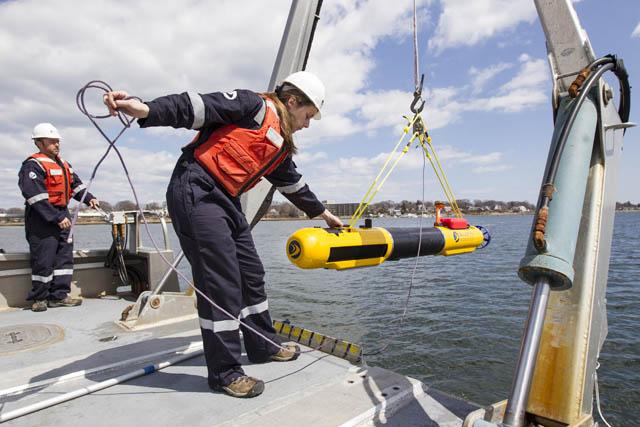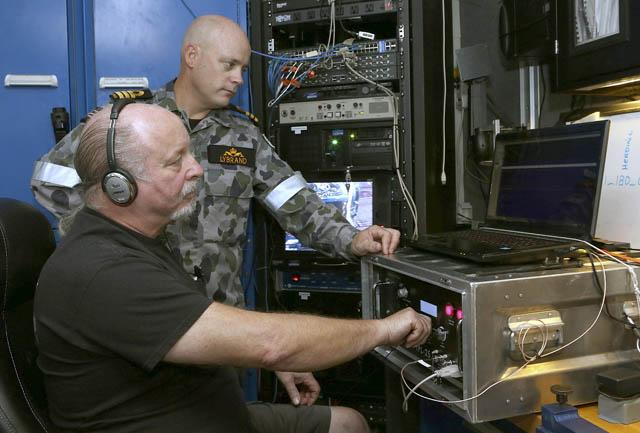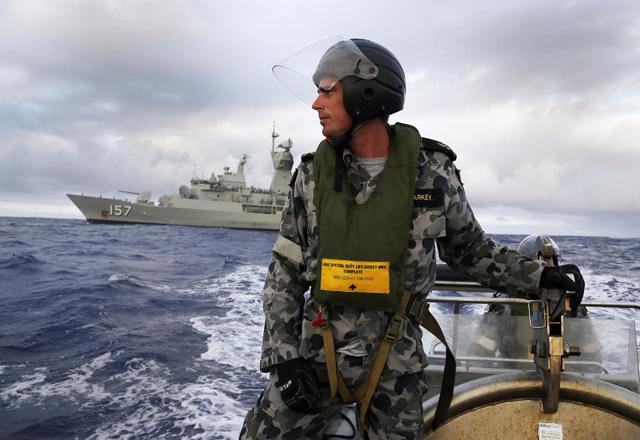You are here
Search for MH370 seeks plane’s ‘final resting place’
By AFP - Apr 10,2014 - Last updated at Apr 10,2014

PERTH, Australia — The hunt for “pings” from the missing Malaysian airliner’s black box narrowed in the remote Indian Ocean on Thursday after fresh signals were detected, raising hopes that wreckage will soon be found.
With the beacon on Flight MH370’s data recorders due to fade more than a month after the Boeing 777 vanished, the Australian-led search continued trawling for signals, seeking to pinpoint an exact location before sending down a submersible to take a look.
The Perth-based Joint Agency Coordination Centre (JACC) announced Thursday that the search area off western Australia had been significantly pared down to 57,923 square kilometres, 10 times smaller than its previous size.
The Australian ship Ocean Shield, bearing a special US Navy “towed pinger locator”, is now focused on a far smaller area of the Indian Ocean 2,280 kilometres northwest of Perth where it picked up two fresh signals Tuesday.
Those transmissions matched a pair of signals logged over the weekend.
“When you put those two [sets of pings] together, it makes us very optimistic,” US Seventh fleet spokesman commander William Marks said, adding that the search was getting “closer and closer”.
“This is not something you find with commercial shipping, not something just found in nature — this is definitely something that is man-made, consistent with what you would find with these black boxes.
“So we are looking pretty good now.”
He told CNN he expected the pings to last “maybe another day or two”.
No floating debris from the aircraft, which disappeared on March 8 with 239 people aboard, has yet been found despite days of exhaustive searching by ships and aircraft from several nations.
Renewed optimism
Officials had feared that the signals which were initially picked up might not be detected again, particularly since the batteries on the “black box” tracking beacons have a normal lifespan of about 30 days.
Australia confirmed Wednesday that the first signals were consistent with black box recorders.
JACC chief Angus Houston said the high-tech underwater surveillance was meant to define a reduced and more manageable search area in depths of around four kilometres, but he acknowledged that time was running out.
“I believe we are searching in the right area but we need to visually identify the aircraft before we can confirm with certainty that this is the final resting place of MH370,” he said Wednesday.
Houston again urged against unduly inflating hopes, for the sake of the families of missing passengers and crew who have endured a month-long nightmare punctuated by a number of false leads.
But he voiced renewed optimism.
“They [experts] believe the signals to be consistent with the specification and description of a flight data recorder,” he said.
No other ships will be allowed near the Ocean Shield as it must work in an environment as free of noise as possible, but up to 10 military aircraft, four civil planes and 13 ships were to take part in surface searches in the region on Thursday, the JACC said.
Houston said it would not be long before a US-made autonomous underwater vehicle called a Bluefin-21 would be sent down to investigate.
“I don’t think that time is very far away,” he said.
The pinger locator can search an area six times that which can be scanned by the Bluefin-21’s sonar.
In Malaysia, Home Minister Zahid Hamidi said there was “no conclusive evidence yet” from the continuing investigation into what caused the plane to divert from its Kuala Lumpur-Beijing route.
Zahid, who oversees law enforcement, said around 180 people had been interviewed, including relatives of passengers and crew as well as airline ground staff and engineers.
“We are filtering all the information. When the evidence is conclusive then we will let the media know about it,” he said.
A number of theories have been put forward to explain MH370’s baffling disappearance.
They include a hijacking or terrorist attack, a pilot gone rogue or a sudden catastrophic event that incapacitated the crew and left the plane to fly for hours until it ran out of fuel in its suspected Indian Ocean crash site.
But no evidence has emerged to bolster any theory.
Related Articles
An Australian ship searching for a missing Malaysia Airlines jetliner has picked up signals consistent with the beacons from aircraft black box recorders, in what search officials said on Monday was the most promising lead yet in the month-long hunt.
There was no let-up in the air and sea search for the missing Malaysian airliner off Australia on Saturday as Prime Minister Tony Abbott warned that locating Flight MH370 would still likely take a long time.
The hunt by a mini-submarine for a Malaysian airliner in the uncharted depths of the Indian Ocean — the latest phase in a huge international search — will end in about a week, Australia says.


















